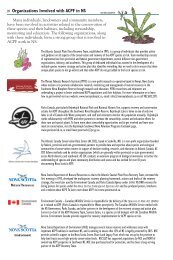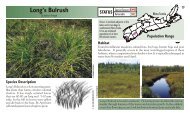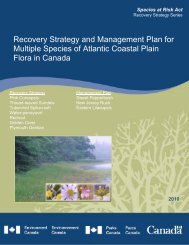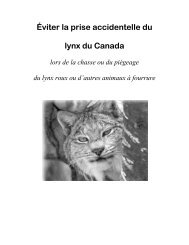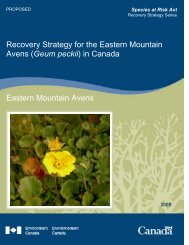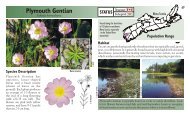Healthy Lakes and Wetlands For Tomorrow - Species at Risk
Healthy Lakes and Wetlands For Tomorrow - Species at Risk
Healthy Lakes and Wetlands For Tomorrow - Species at Risk
You also want an ePaper? Increase the reach of your titles
YUMPU automatically turns print PDFs into web optimized ePapers that Google loves.
LAWN <strong>and</strong> GARDEN<br />
Sometimes wh<strong>at</strong> we consider to be weeds <strong>and</strong> pests are wh<strong>at</strong> many wildlife species<br />
consider to be food <strong>and</strong> shelter. The substances used to remove pests <strong>and</strong> weeds can<br />
pollute the w<strong>at</strong>er sources we depend on <strong>and</strong> the habit<strong>at</strong>s many wildlife species call home.<br />
There are ways to care for your lawn <strong>and</strong> garden th<strong>at</strong> minimize impacts to the wildlife<br />
around us.<br />
Monarch Butterfly<br />
Plant n<strong>at</strong>ive species <strong>and</strong> use local soils <strong>and</strong> fills.<br />
N<strong>at</strong>ive veget<strong>at</strong>ion is n<strong>at</strong>urally adapted, does not require fertilizers<br />
or pesticides, <strong>and</strong> is drought resistant. Planting n<strong>at</strong>ive species<br />
around your property helps to maintain the n<strong>at</strong>ural biodiversity<br />
of the area, provides wildlife with food <strong>and</strong> shelter, <strong>and</strong> reduces<br />
the chances of introducing invasive alien species. N<strong>at</strong>ive flowers <strong>at</strong>tract local butterfly <strong>and</strong> bird species in<br />
the summer <strong>and</strong> provide seeds <strong>and</strong> berries throughout the fall <strong>and</strong> winter. Ask for n<strong>at</strong>ive plants <strong>at</strong> garden<br />
centers <strong>and</strong> confirm th<strong>at</strong> they are genetically n<strong>at</strong>ive to your area.<br />
Bl<strong>and</strong>ing’s Turtle Nest Cage<br />
Reduce or elimin<strong>at</strong>e your lawn. Keep it well away from lakes <strong>and</strong> wetl<strong>and</strong>s.<br />
Lake shoreline properties without lawns are your best bet. If you feel a lawn is necessary try to keep<br />
it on the side of the house away from the lake. If your lawn currently ends <strong>at</strong> the lake shoreline, try to<br />
encourage the growth of n<strong>at</strong>ural veget<strong>at</strong>ion by leaving the grass uncut <strong>and</strong> allowing n<strong>at</strong>ive veget<strong>at</strong>ion to<br />
return. This will save time <strong>and</strong> money. If this sounds like a big task, start slowly <strong>and</strong> leave a couple meters<br />
each year to revert back to n<strong>at</strong>ural veget<strong>at</strong>ion.<br />
Practice lawn care techniques th<strong>at</strong> reduce w<strong>at</strong>er use <strong>and</strong> discourage weed growth.<br />
Grass th<strong>at</strong> is cut to a height of 7-8 cm (3 inches) is less prone to pests, disease, <strong>and</strong> drought. W<strong>at</strong>ering less<br />
often allows the top of the soil to dry out <strong>and</strong> will help prevent the growth of “weedy” plants.<br />
Limit or elimin<strong>at</strong>e chemical fertilizer use.<br />
Instead, try using compost made from your kitchen scraps (in an animal proof compost bin). Atlantic<br />
Coastal Plain Flora species are found in low nutrient, high disturbance areas where other plant species<br />
cannot grow. The addition of nutrients shifts this balance <strong>and</strong> encourages the growth of plants th<strong>at</strong> push<br />
out these species. Fertilizers increase the level of nitrogen <strong>and</strong> phosphorus in the environment <strong>and</strong> can<br />
cre<strong>at</strong>e large, smelly algal blooms. This reduces the amount of light <strong>and</strong> available oxygen in the w<strong>at</strong>er <strong>and</strong><br />
can choke out other aqu<strong>at</strong>ic plants <strong>and</strong> animals. It also makes activities such as swimming <strong>and</strong> bo<strong>at</strong>ing<br />
unpleasant due to w<strong>at</strong>er discolour<strong>at</strong>ion <strong>and</strong> clogged bo<strong>at</strong> motors - things we all want to avoid!<br />
23



